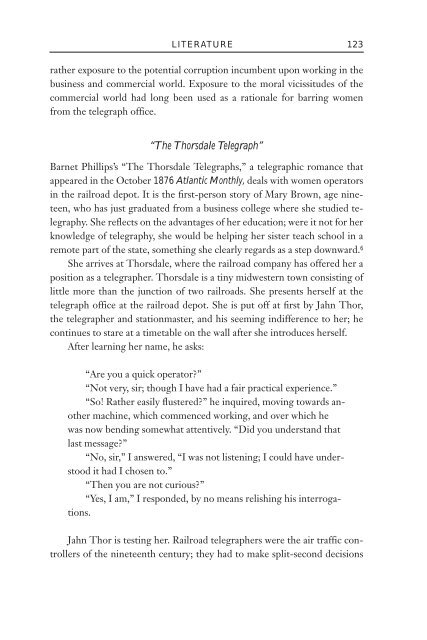My Sisters Telegraphic: Women in the Telegraph Office ... - Monoskop
My Sisters Telegraphic: Women in the Telegraph Office ... - Monoskop
My Sisters Telegraphic: Women in the Telegraph Office ... - Monoskop
Create successful ePaper yourself
Turn your PDF publications into a flip-book with our unique Google optimized e-Paper software.
LITERATURE 123<br />
ra<strong>the</strong>r exposure to <strong>the</strong> potential corruption <strong>in</strong>cumbent upon work<strong>in</strong>g <strong>in</strong> <strong>the</strong><br />
bus<strong>in</strong>ess and commercial world. Exposure to <strong>the</strong> moral vicissitudes of <strong>the</strong><br />
commercial world had long been used as a rationale for barr<strong>in</strong>g women<br />
from <strong>the</strong> telegraph office.<br />
“The Thorsdale <strong>Telegraph</strong>”<br />
Barnet Phillips’s “The Thorsdale <strong>Telegraph</strong>s,” a telegraphic romance that<br />
appeared <strong>in</strong> <strong>the</strong> October 1876 Atlantic Monthly, deals with women operators<br />
<strong>in</strong> <strong>the</strong> railroad depot. It is <strong>the</strong> first-person story of Mary Brown, age n<strong>in</strong>eteen,<br />
who has just graduated from a bus<strong>in</strong>ess college where she studied telegraphy.<br />
She reflects on <strong>the</strong> advantages of her education; were it not for her<br />
knowledge of telegraphy, she would be help<strong>in</strong>g her sister teach school <strong>in</strong> a<br />
remote part of <strong>the</strong> state, someth<strong>in</strong>g she clearly regards as a step downward. 6<br />
She arrives at Thorsdale, where <strong>the</strong> railroad company has offered her a<br />
position as a telegrapher. Thorsdale is a t<strong>in</strong>y midwestern town consist<strong>in</strong>g of<br />
little more than <strong>the</strong> junction of two railroads. She presents herself at <strong>the</strong><br />
telegraph office at <strong>the</strong> railroad depot. She is put off at first by Jahn Thor,<br />
<strong>the</strong> telegrapher and stationmaster, and his seem<strong>in</strong>g <strong>in</strong>difference to her; he<br />
cont<strong>in</strong>ues to stare at a timetable on <strong>the</strong> wall after she <strong>in</strong>troduces herself.<br />
After learn<strong>in</strong>g her name, he asks:<br />
“Are you a quick operator?”<br />
“Not very, sir; though I have had a fair practical experience.”<br />
“So! Ra<strong>the</strong>r easily flustered?” he <strong>in</strong>quired, mov<strong>in</strong>g towards ano<strong>the</strong>r<br />
mach<strong>in</strong>e, which commenced work<strong>in</strong>g, and over which he<br />
was now bend<strong>in</strong>g somewhat attentively. “Did you understand that<br />
last message?”<br />
“No, sir,” I answered, “I was not listen<strong>in</strong>g; I could have understood<br />
it had I chosen to.”<br />
“Then you are not curious?”<br />
“Yes, I am,” I responded, by no means relish<strong>in</strong>g his <strong>in</strong>terrogations.<br />
Jahn Thor is test<strong>in</strong>g her. Railroad telegraphers were <strong>the</strong> air traffic controllers<br />
of <strong>the</strong> n<strong>in</strong>eteenth century; <strong>the</strong>y had to make split-second decisions

















